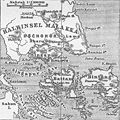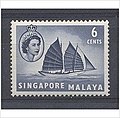Portal:Singapore
 Map of Singapore Singapore, officially the Republic of Singapore, is an island country and city-state in Southeast Asia. The country's territory comprises one main island, 63 satellite islands and islets, and one outlying islet. It is about one degree of latitude (137 kilometres or 85 miles) north of the equator, off the southern tip of the Malay Peninsula, bordering the Strait of Malacca to the west, the Singapore Strait to the south along with the Riau Islands in Indonesia, the South China Sea to the east, and the Straits of Johor along with the State of Johor in Malaysia to the north.
Singapore's history dates back at least eight hundred years, having been a maritime emporium known as Temasek and subsequently a major constituent part of several successive thalassocratic empires. Its contemporary era began in 1819, when Stamford Raffles established Singapore as an entrepôt trading post of the British Empire. In 1867, Singapore came under the direct control of Britain as part of the Straits Settlements. During World War II, Singapore was occupied by Japan in 1942 and returned to British control as a separate Crown colony following Japan's surrender in 1945. Singapore gained self-governance in 1959 and, in 1963, became part of the new federation of Malaysia, alongside Malaya, North Borneo, and Sarawak. Ideological differences led to Singapore's expulsion from the federation two years later; Singapore became an independent sovereign country in 1965. After early years of turbulence and despite lacking natural resources and a hinterland, the nation rapidly developed to become one of the Four Asian Tigers. As a highly developed country, it has one of the highest PPP-adjusted GDP per capita in the world. It is also identified as a tax haven. Singapore is the only country in Asia with a AAA sovereign credit rating from all major rating agencies. It is a major aviation, financial, and maritime shipping hub and has consistently been ranked as one of the most expensive cities to live in for expatriates and foreign workers. Singapore ranks highly in key social indicators: education, healthcare, quality of life, personal safety, infrastructure, and housing, with a home-ownership rate of 88 percent. Singaporeans enjoy one of the longest life expectancies, fastest Internet connection speeds, lowest infant mortality rates, and lowest levels of corruption in the world. It has the third highest population density of any country in the world, although there are numerous green and recreational spaces as a result of urban planning. With a multicultural population and in recognition of the cultural identities of the major ethnic groups within the nation, Singapore has four official languages: English, Malay, Mandarin, and Tamil. English is the common language, with exclusive use in numerous public services. Multi-racialism is enshrined in the constitution and continues to shape national policies in education, housing, and politics. Singapore is a parliamentary republic in the Westminster tradition of unicameral parliamentary government, and its legal system is based on common law. While the country is de jure a multi-party democracy with free elections, the government under the People's Action Party (PAP) wields widespread control and political dominance. The PAP has governed the country continuously since full internal self-government was achieved in 1959, and holds a supermajority in Parliament. One of the five founding members of ASEAN, Singapore is also the headquarters of the Asia-Pacific Economic Cooperation Secretariat, the Pacific Economic Cooperation Council Secretariat, and is the host city of many international conferences and events. Singapore is also a member of the United Nations, the World Trade Organization, the East Asia Summit, the Non-Aligned Movement, and the Commonwealth of Nations. (Full article...)Selected article -The Mass Rapid Transit system, locally known by the initialism MRT, is a rapid transit system in Singapore and the island country's principal mode of railway transportation. After two decades of planning the system commenced operations in November 1987 with an initial 6 km (3.7 mi) stretch consisting of five stations. The network has since grown to span the length and breadth of the country's main island – with the exception of the forested core and the rural northwestern region – in accordance with Singapore's aim of developing a comprehensive rail network as the backbone of the country's public transportation system, averaging a daily ridership of 3.45 million in 2023. The MRT network encompasses approximately 242.6 km (150.7 mi) of grade-separated route on standard gauge. As of 2024, there are currently 142 operational stations dispersed across six operational lines arrayed in a circle-radial topology. Two more lines and 45 stations are currently under construction, in addition to ongoing extension works on existing lines. In total, this will schedule the network to double in length to about 460 km (290 mi) by 2040. Further studies are ongoing on potential new alignments and lines, as well as infill stations in the Land Transport Authority's (LTA) Land Transport Masterplan 2040. The island-wide heavy rail network interchanges with a series of automated guideway transit networks localised to select suburban towns — collectively known as the Light Rail Transit (LRT) system — which, along with public buses, complement the mainline by providing a last mile link between MRT stations and HDB public housing estates. (Full article...) Selected picture The Singapore Cable Car provides an aerial link from Mount Faber on the main island of Singapore to the resort island of Sentosa across the Keppel Harbour. Opened on 15 February 1974, it was the first aerial ropeway system in the world to span a harbour. Read more... General imagesThe following are images from various Singapore-related articles on Wikipedia.
Selected biography -Tao Li (Chinese: 陶李; pinyin: Táo Lǐ; born 10 January 1990) is a Chinese-born Singaporean competitive swimmer who specializes in the backstroke and butterfly. Tao has represented Singapore at the Southeast Asian Games (SEA Games), the Asian Games, World Championship, Commonwealth Games and Olympics. She holds several national records and is the only female Singapore swimmer who qualified for an Olympic Final. (Full article...) Did you know (auto-generated)
In this month
More did you know -
Selected panoramaTanjong Chek Jawa (or Tanjung Chek Jawa or simply Chek Jawa; Chinese: 仄爪哇) is a cape and the name of its 100-hectare wetlands located on the south-eastern tip of Pulau Ubin, an island off the north-eastern coast of the main island of Singapore. Singapore topicsRelated portalsSoutheast Asia Other Countries Tasks
CategoriesWikiprojectsAssociated WikimediaThe following Wikimedia Foundation sister projects provide more on this subject:
Discover Wikipedia using portals |






























































